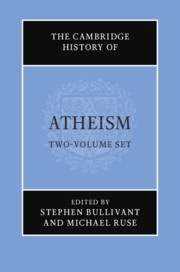Book contents
- The Cambridge History of Atheism
- The Cambridge History of Atheism
- Copyright page
- Dedication
- Contents
- Acknowledgments
- Contributors
- Introduction
- Part I Preliminaries
- Part II Atheisms in History
- Part III Reformation, Renaissance, Enlightenment
- 10 Reformation
- 11 Early Modern England
- 12 Spinoza and the Low Countries
- 13 Seventeenth- and Eighteenth-Century France
- 14 The Scientific Revolution
- 15 The Scottish Enlightenment
- 16 Al-Ghazālī
- 17 Lives of Jesus and Historico-critical Skepticism
- Part IV Classical Modernity: Philosophical and Scientific Currents
- Part V Classical Modernity: Social and Political Currents
- Part VI Twentieth and Twenty-First Centuries: Intellectual and Artistic Currents
- Part VII Lived Atheism in the Twentieth- and Twenty-First Centuries: Case-Studies
- Part VIII Emerging Atheisms in the Twenty-First Century
- Part IX Conclusion
- Index
- References
16 - Al-Ghazālī
from Part III - Reformation, Renaissance, Enlightenment
Published online by Cambridge University Press: 25 September 2021
- The Cambridge History of Atheism
- The Cambridge History of Atheism
- Copyright page
- Dedication
- Contents
- Acknowledgments
- Contributors
- Introduction
- Part I Preliminaries
- Part II Atheisms in History
- Part III Reformation, Renaissance, Enlightenment
- 10 Reformation
- 11 Early Modern England
- 12 Spinoza and the Low Countries
- 13 Seventeenth- and Eighteenth-Century France
- 14 The Scientific Revolution
- 15 The Scottish Enlightenment
- 16 Al-Ghazālī
- 17 Lives of Jesus and Historico-critical Skepticism
- Part IV Classical Modernity: Philosophical and Scientific Currents
- Part V Classical Modernity: Social and Political Currents
- Part VI Twentieth and Twenty-First Centuries: Intellectual and Artistic Currents
- Part VII Lived Atheism in the Twentieth- and Twenty-First Centuries: Case-Studies
- Part VIII Emerging Atheisms in the Twenty-First Century
- Part IX Conclusion
- Index
- References
Summary
In the late modern period, western powers began to study eastern cultures, religions, languages, and territories other than their own under the label of orientalism. In his groundbreaking book, Edward Said (1978) came to eventually redefine what orientalism really was. In his understanding it was the rationalization of a Eurocentric worldview within which the ‘others’ (eastern civilizations) were depicted as inferior, intellectually inadequate, and regressive as a means of justifying the political, cultural, and intellectual superiority of the west. While much can be critiqued of Said’s project, it is nonetheless not absolutely untrue.
- Type
- Chapter
- Information
- The Cambridge History of Atheism , pp. 291 - 307Publisher: Cambridge University PressPrint publication year: 2021

